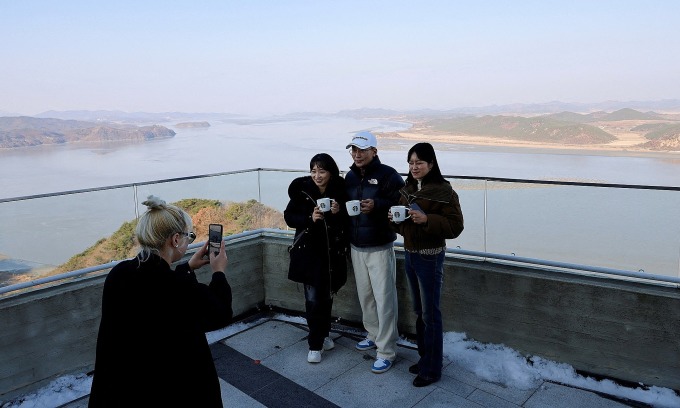Starbucks serves South Koreans coffee and glimpse into the North
Customers holding a cup of coffee pose to take a picture with North Korea’s propaganda village Kaepoong in the background, at the top of the Aegibong Peak Observatory, south of the demilitarized zone (DMZ), separating the two Koreas, in Gimpo, South Korea, Nov. 29, 2024. Photo by Reuters
Hundreds showed up on Friday for the opening of the U.S. coffeehouse chain’s newest store in an observatory near the city of Gimpo, around 50 km (31 miles) northwest of Seoul and close to the Demilitarized Zone separating the two Koreas.
The DMZ has become an unlikely draw for foreign and local tourists, despite a spike in tensions on the Korean peninsula in recent years.
Visitors must pass through a military checkpoint on the way to the Starbucks outlet, although it is in a lesser known and less militarized area than more popular tourist spots along the border such as the Panmunjom truce village.
A river designated as “neutral waters” runs between the observatory and the border town of Kaepung in the North just 1.4 km away. On a clear day, North Korean villagers can be seen from the observatory through its telescopes.
The two Koreas are still technically at war after a three-year conflict ended in a 1953 armistice. A peace treaty has never been signed.
In recent months, tensions have also grown over balloons of trash floated from North Korea, which Pyongyang says are a response to balloons carrying anti-regime leaflets sent by activists in the South.
North Korea blew up inter-Korean roads and rail lines on its side of the border last month, while Seoul warned Pyongyang that any use of its nuclear weapons would spell the end of the North Korean regime.
Baek Hea-soon, a 48-year-old Gimpo resident, arrived early on Friday to try out the new Starbucks outlet.
“I wish I could share this tasty coffee with the people in North Korea,” she said.
North Korea has over recent decades suffered serious food shortages, including a famine in the 1990s, often exacerbated by natural disasters such as floods that damage harvests.
Starbucks, with its global recognition, could change the border area’s “dark and depressing” image, Gimpo Mayor Kim Byung-soo said.
“This place could now become an important tourist destination for security (and) peace that can be seen as young, bright and warm, as well as garnering global attention,” Kim told reporters.
Starbucks is ubiquitous across South Korea, with 1,980 stores as of the third quarter of 2024, according to SCK Company, which operates Starbucks in the country through a licensing deal.
In 2021, Starbucks Corp sold its stake in Starbucks Korea to Starbucks Coffee Korea Co, now known as SCK Company, and Singapore sovereign wealth fund GIC.


Comments are closed.